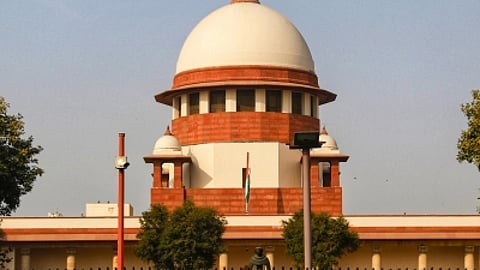

All electoral bonds that have not been encashed yet should be returned by the political parties to the purchaser. The order to this effect was passed by the Supreme Court on Thursday, February 15, after a five-judge constitution bench declared the electoral bonds scheme unconstitutional. According to the order, electoral bonds that have not been encashed yet and are within the 15-day validity period be returned to the purchaser of the bonds.
The bench headed by Chief Justice of India (CJI) DY Chandrachud also directed the State Bank of India (SBI), the issuer of electoral bonds, to submit the details of buyers of electoral bonds and the political parties that encashed the bonds to the Election Commission of India (ECI) before March 6, 2024. The ECI has been directed to publish these details on its official website by March 13.
The directions issued by the five-judge bench are:
SBI should immediately stop issuing electoral bonds.
SBI should submit the details of electoral bonds that were purchased since April 12, 2019, till date to the ECI before March 6. In April 2019, the Supreme Court had passed an interim order directing all parties to submit the details of donations received through electoral bonds to the ECI in a sealed cover. These details shall include date of purchase, name of purchaser, and denomination of electoral bonds that were purchased.
SBI should submit the details of all political parties that have received contributions through electoral bonds since April 12, 2019, till date to ECI. These details shall include details of each electoral bond encashed by political parties with dates of encashment and denomination of the bonds. This should also be done before March 6.
ECI should publish all these details on its official website before March 13.
Electoral bonds within the validity period of 15 days, which are not encashed by political parties yet, shall be returned to the bank, who will then return it to the purchaser.
The five-judge bench, also comprising Justices Sanjiv Khanna, BR Gavai, JB Pardiwala, and Manoj Misra, deemed the scheme unconstitutional and struck it down. The court said that the amendments made to section 29C (declaration of donation received by the political parties) of Representation of the People Act, Section 183(3) (power of board and other persons to make contributions to national defence fund, etc) of the Companies Act, and Section 13A(b) (special provision relating to incomes of political parties) of the Income Tax Act are violative of the right to information under Article 19(1)(a) of the Constitution.
Electoral bonds were introduced in 2017 through the Finance Act, which was passed as a money bill without the assent of the Rajya Sabha. The Finance Act amended the Reserve Bank of India Act, Companies Act, Income Tax Act, Representation of Peoples Act, and Foreign Contributions Regulation Act (FCRA), so as to introduce electoral bonds. Electoral bonds are similar to promissory notes and allows donors to buy these bonds from the SBI and donate anonymously to political parties. These bonds will not have the donor’s name and neither are political parties required to disclose the source of these bonds. The value of the bonds will be calculated as income by voluntary contributions for a political party for exemption from income tax.
In November 2023, the Constitution Bench had reserved its verdict on pleas challenging the validity of the electoral bonds scheme after hearing the arguments for three days in a row. The petitioners before the apex court had argued that the Electoral Bond Scheme violates the citizen's fundamental right to information under Article 19(1) and it enables backdoor lobbying and promotes corruption and eliminates level playing field for political parties in the Opposition.
Read: Supreme Court strikes down electoral bond scheme, calls it unconstitutional